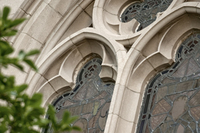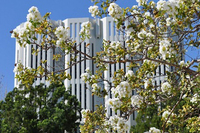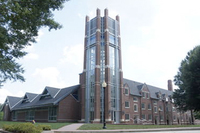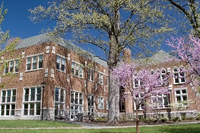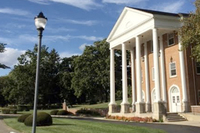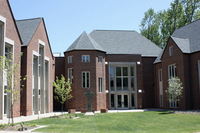Search
11 items
-
Engaged Organizations: Web of Creation
The Web of Creation website discuss their organization aim and services that they provide:
"The Web of Creation was established to foster the movement for personal and social transformation to a just and sustainable world from religious perspectives. To that end, the information at this site will:
-Connect you with ideas, resources and strategies for doing eco-justice
-Inform, inspire, encourage, educate you about eco-justice
-Support you in your efforts to live, work and pray in ways that promote eco-justice
The Web of Creation has also been developed to provide information and connections for theology students interested in environmental ministry." -
Engaged Organizations: General Board of Global Ministries
General Board of Global Ministries discuss their vision and span of their work on their website. Their areas of impact run the gamut for a multitude of environmental and social justice issues:
"Connection is at the core of our work. Global Ministries connects The United Methodist Church, its people and congregations to partner with others engaged in God’s global work, which takes place in a variety of settings, countries and cultures.
Global Ministries works through missionaries and partners in more than 60 countries around the world. " -
Engaged Organizations: Austin Presbyterian Theological Seminary
Austin Presbyterian Theological Seminary participates in the Green Seminary Initiative. In addition to their larger mission (as stated on their website at https://www.austinseminary.edu/), the GSI website describes their environmental efforts:
"Austin Presbyterian Theological Seminary has offered three faith-based environmental courses: “Environmental Ethics,” “Nature, Theology, and Ethics: Christian Spirituality and Creation Care,” and “Christian Creation and Spirituality.” These courses are taught by Dr. William Greenway, Associate Professor of Philosophical Theology. During his tenure at Austin, Dr. Greenway has taught several other faith-based environmental courses including "Nature, Theology, and Ethics" and an experiential course titled "An Adventure in Wilderness and Spirituality." In recent years, Austin has been steadily increasing its environmental commitments through its curriculum and communal worship. In joining the program, Austin brings cross-disciplinary faculty expertise, commitment to outdoor chapel services, and the implementation of an Energy Management System to reduce the school’s carbon footprint."
Austin Presbyterian Theological Seminary strives to infuse care of the earth into all aspects of theological education. -
Engaged Organizations: Boston University School of Theology
Boston University School of Theology participates in the Green Seminary Initiative. In addition to their larger mission (as stated on their website at https://www.bc.edu/content/bc-web/schools/stm.html), the GSI website describes their environmental efforts:
"Located in Boston, MA, Boston University School of Theology is a United Methodist seminary with broad ecumenical connections, including Episcopal and United Church of Christ Communities of Learning. BU has been actively working toward ecological justice since 2008, and built green initiatives into their strategic plan in 2010. BU brings to the Green Seminary Initiative an expertise in how to imagine what is possible as a theological school embedded in a large university that is also committed to ecological sustainability. They also exemplify what it means to transform curriculum and communal practice, and renovate aged buildings."
Boston University School of Theology strives to infuse care of the earth into all aspects of theological education. -
Engaged Organizations: Claremont School of Theology
Claremont School of Theological participates in the Green Seminary Initiative. In addition to their larger mission (as stated on their website at https://cst.edu/), the GSI website describes their environmental efforts:
"Claremont School of Theology in Claremont, CA, is a United Methodist Church seminary. Ecological sustainability has been a priority for the school since the tenure of Professor John Cobb, an early eco-theologian who began work at Claremont in 1960. Claremont held its first conference on the environmental crisis in 1971. The leaders of Claremont’s Green Team, Dr. Philip Clayton and Kristin Ritzau, shared with GSI that they see the certification process as a way to become a place of ecological education and empowerment for seminary leaders, students, and community members in Southern California. Claremont enters the program eager to share its curriculum and syllabi from multiple eco-classes and programs."
Claremont School of Theology strives to infuse care of the earth into all aspects of theological education. -
Engaged Organizations: Columbia Theological Seminary
Columbia Theological Seminary participates in the Green Seminary Initiative. In addition to their larger mission (as stated on their website at https://www.ctsnet.edu/), the GSI website describes their environmental efforts:
"Columbia Theological Seminary, a school in the Presbyterian Church (USA), has been a leader in ecological theological education for the last decade. They have two LEED Gold buildings on campus in Decatur, GA, was one of the founding members of the Seminary Stewardship Alliance, and their late president Steve Hayner began a Sustainability Commission that continues to this day. They also bring to the certification program a commitment to health, imagination, and resilience."
Columbia Theological Seminary strives to infuse care of the earth into all aspects of theological education. -
Engaged Organizations: Drew Theological School
Drew Theological School participates in the Green Seminary Initiative. In addition to their larger mission (as stated on their website at https://www.drew.edu/theological-school/), the GSI website describes their environmental efforts:
"Drew Theological School, a seminary of the United Methodist Church and part of Drew University in Madison, NJ, hosts The Green Seminary Initiative. Professor Laurel Kearns heads the Green Team, which also includes Dr. Catherine Keller and Dr. Heather Elkins on the faculty. All three publish, teach, and lecture on topics related to theology and eco-justice, joined by several other faculty who bring environmental concerns into their classes. Recently, eco-justice began to be integrated throughout the curriculum, building on almost two dozen courses with an ecological focus, including several required courses. Students can focus on religion and ecology in all degree programs. Drew’s other environmental initiatives include environmental justice field trips, native species and integrated pest management, water bottle refilling stations, reusable cutlery and sustainable food options. The campus includes a community garden, arboretum, labyrinth, native species planting, and a forest. The school is particularly proficient in establishing environmental policies to guide its institutional practices, and integrating environmental themes into chapel services, curriculum, speakers, cross-cultural trips, and broad social justice work."
Drew Theological School strives to infuse care of the earth into all aspects of theological education. -
Engaged Organizations: Methodist Theological School in Ohio
Methodist Theological School in Ohio participates in the Green Seminary Initiative. In addition to their larger mission (as stated on their website at https://www.mtso.edu/), the GSI website describes their environmental efforts through the following excerpts:
"MTSO has a Sustainability and Land Initiative, which includes Seminary Hill Farm, a certified organic farm that makes it possible for MTSO to incorporate environmental learning into student life. This farm plays a prominent role in the school’s Ecology and Social Justice specialization."
"The Sustainability and Land Initiative seeks to further MTSO’s aspiration to 'prepare and invigorate transformational leaders to engage the church and the world in leadership and service' by creating a 'sustainable campus plan which establishes a model for theological education through the cultivation of sustainable teaching and learning communities on our land.' Current practices in sustainability include 90% of all food served in Dunn Dining Hall being sourced from organic and humane farms within 50 miles of campus, a Community Supported Agriculture (CSA) program, and commitments to urban farming partners in nearby Columbus. The campus has also installed geothermal heating/cooling and solar panels to power its administration and academic buildings."
Methodist Theological School in Ohio strives to infuse care of the earth into all aspects of theological education, including its offering of eight distinct religious-environmental courses. -
Engaged Organizations: Pacific Lutheran Theological Seminary
Pacific Lutheran Theological Seminary participates in the Green Seminary Initiative. In addition to their larger mission (as stated on their website at https://www.plts.edu/), the GSI website describes their environmental efforts:
"Pacific Lutheran Theological Seminary (PLTS) is a seminary of the Evangelical Lutheran Church in America, a graduate school of California Lutheran University, and a founding member of the Graduate Theological Union interfaith consortium in Berkeley, CA. PLTS decided to enter the Certification Program soon after their president Dr. Chris Kimball signed the Second Nature Climate Commitment, committing both the university and seminary to achieving carbon neutrality and developing strategies for resilience. PLTS has moved recently to a new urban campus in the heart of Berkeley, and is committed to exploring the relationships between earth care and justice issues of race, class, and gender."
Pacific Lutheran Theological Seminary strives to infuse care of the earth into all aspects of theological education. -
Engaged Organizations: Trinity Lutheran Seminary
Trinity Lutheran Seminary participates in the Green Seminary Initiative. In addition to their larger mission (as stated on their website at https://www.capital.edu/trinity-lutheran-seminary-at-capital-university/), the GSI website describes their environmental efforts:
"Located in Columbus, OH, and a seminary in the Evangelical Lutheran Church of America, Trinity has engaged in a number of steps required in the certification process, including an energy audit, updating the seminary’s HVAC system, tracking campus energy use, and enhancing recycling efforts. The student group SEEDS held a retreat in April at Lutheran Memorial Camp and students have participated in a Faith Climate Action Rally at the Ohio Statehouse. In addition, Trinity students have been active in cleaning up the Alum Creek watershed that borders the seminary property. The school has cultivated a garden, and students, faculty, and staff held a worship service to bless it. The school engages with the natural landscape surrounding the campus through hikes and excursions."
Trinity Lutheran Seminary strives to infuse care of the earth into all aspects of theological education.
-
Engaged Organizations: Union Presbyterian Seminary, Charlotte
Union Presbyterian Seminary, Charlotte, participates in the Green Seminary Initiative. In addition to their larger mission (as stated on their website at https://www.upsem.edu/alumni-connect/charlotte-campus/), the GSI website describes their environmental efforts:
"Union Presbyterian Seminary at Charlotte is a part-time, non-residential seminary extension of Union Presbyterian Seminary in Richmond, Va. We have a brand new campus located in the fast-growing South Park area of Charlotte. While our home campus is pursuing a partnership with Shalom Farms, incorporating a community garden and classes in the ethics of food and eco-justice, the Charlotte campus is pursuing its commitment to “church and the world” in several different ways. Having just completed our energy audit, we are committed to making an already efficient building more so. We are Including new course offerings that focus on faith and environmental issues, such as Paul Galbreath’s upcoming class on “Ecology and Worship.” Rodney Sadler is challenging us to step up as advocates in areas such as the use of solar energy in congregational and seminary facilities. We look forward to learning from our colleagues in the GSI in the years ahead."
Union Presbyterian Seminary, Charlotte strives to infuse care of the earth into all aspects of theological education.




